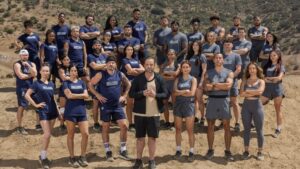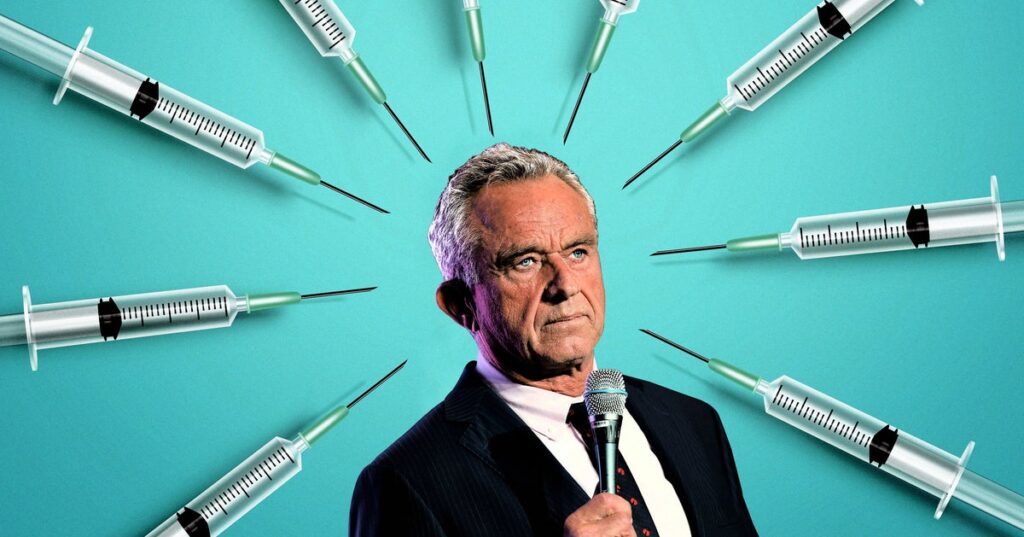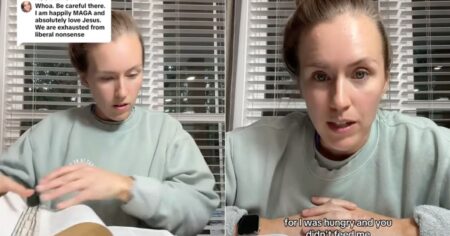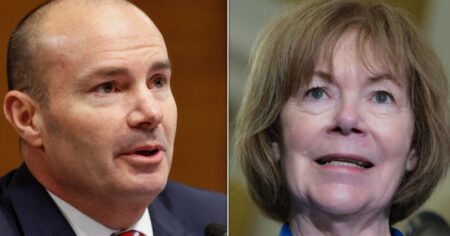After the firing of the CDC’s entire vaccine advisory committee and the ensuing replacement of some of these folks by anti-vaccine advocates, it’s no secret that vaccines in this country are under attack by Health and Human Services Secretary Robert F. Kennedy Jr. and others in the Trump administration.
In many, many interviews, Kennedy, an anti-vaccine activist, has repeated false claims about vaccines, their side effects and their safety.
During a recent Fox News interview in which Kennedy tried to justify his firing of the Centers for Disease Control and Prevention’s vaccine advisory committee, he further sowed vaccine distrust by repeating inflammatory statements.
In the interview, Kennedy said children only needed 11 vaccines in 1986 and now need “between 69 and 92 vaccines before they’re 18.” He claims this high number of mandatory vaccines (which doctors say is wrong) also includes the multiple doses needed for certain vaccines, such as the polio vaccine, which is a four-series shot — meaning, kids need four shots to be fully protected.
Kennedy’s misinformation didn’t stop there, though. He went on to say that, other than the COVID-19 shot, vaccines for kids aren’t safety tested, so the “risk profiles are unknown.” This is not the first time Kennedy has questioned the safety of vaccines, even though there is actually nothing to question there. Vaccines are perfectly safe. (More on that below.)
Pediatricians say his statements are deeply misinformed and important to correct. Here’s what they told HuffPost:
RFK Jr. is wrong. Children do not get anywhere near 69 to 92 vaccinations.
In the Fox News clip, Kennedy said it’s mandatory in many states for children to get between 69 and 92 vaccines before they turn 18. This is flat-out wrong.
“I’m a part of a group that did one analysis, and we saw 54 to 58 range for most children, depending on which combination vaccines they get, and that’s if you get all of them,” said Dr. David Higgins, a pediatrician and preventive medicine specialist at the University of Colorado Anschutz Medical Campus.
Not all kids get the flu shot or COVID shot each year, which decreases the number of overall shots to about 35 shots over 18 years, said Dr. Mona Amin, a pediatrician in Florida.
“It’s OK if you’re vaccine curious, but it is not OK to say that something is dangerous when it’s not dangerous, when we don’t have any data to support that.”
– Dr. Mona Amin
“Not only are the numbers misleading, but also they’re presented in a way that seems to intentionally want to make people afraid,” Higgins noted.
Sixty-nine to 92 shots sound like a lot because it is, and it also sounds like kids are getting them all at once, which isn’t the case, Higgins noted.
“Those numbers really are scare tactics,” Amin stressed. The idea that any child is getting 92 pokes from 0 to 18 is wrong, Amin added.
Yes, kids did get fewer vaccinations in 1986, but that is not a good thing.
Amin said there are more vaccines now than in the ’80s, that is true, but that’s because science is now able to protect against more illnesses than ever.
“It’s not a negative. It’s a positive thing that we’re now able to protect against more illnesses,” Amin said.
“As an example, in 1983 there was no protection against meningitis, hepatitis A, hepatitis B, rotavirus, pneumococcus, chicken pox, influenza or HPV,” Amin added.
This isn’t an unchecked expansion, Higgins added. Instead, it’s science doing what it needs to do to protect children (and adults) from morbidity and mortality from disease and bacteria, Amin said.
“That’s the only thing that we’re creating vaccines for,” Amin noted.
Vaccines aren’t created for illnesses that don’t cause severe harm, such as hand, foot and mouth disease, “because we don’t see hospitalizations from hand-foot-mouth. We don’t see children dying from hand-foot-mouth,” Amin said.
“But things like norovirus, things like RSV, things like COVID … science evolved to create vaccines for things that are causing children harm,” she noted.
The availability of more vaccines to prevent disease and keep people out of the hospital should be looked at as a public health success story, Higgins said.
RuslanDashinsky via Getty Images
RFK Jr.’s claim that vaccines aren’t safety-tested is ‘unequivocally false,’ experts say.
Once again, it’s certainly not the first time Kennedy has said vaccines aren’t safe and that they aren’t held to the same testing standards as other products, but Higgins said these safety claims are “unequivocally false.”
“Every single vaccine on the childhood schedule goes through rigorous safety and efficacy trials and testing,” Higgins said.
“Every vaccine is studied in a clinical trial. That is hands-down true,” Amin said.
Scientists spend years identifying the right ingredients for vaccines and conducting pre-clinical testing on cells (and sometimes animals) all before doing multiple phases of clinical trials in people, Amin said.
“The claim that vaccines have never been tested or have never been proven safe misrepresents both the science and the regulatory process, when in fact, vaccines are arguably tested for safety more than any medical imprint intervention that we have,” noted Higgins.
Even after vaccines are recommended, there are surveillance systems in place to monitor for rare side effects that weren’t seen during trials, he noted. A real-life example of this surveillance system is the pulling of the Johnson & Johnson COVID vaccine because of its blood clot risk, Amin said. The risks outweighed the benefit in this case, so the vaccine came off the market.
Higgins added that he doesn’t “blindly recommend” vaccines for kids, but does so because these shots go through such in-depth safety and effectiveness studies.
“That’s what gives me confidence in being able to recommend vaccines … and I think a lot of people are missing that when they hear, whether it’s from the secretary of HHS or whether it’s from social media, when they hear this idea that they haven’t been safety tested,” noted Higgins.
“That is false. It is dangerously false,” he said.
And RFK Jr.’s claim that the shots aren’t placebo-tested isn’t right, either.
In the Fox News interview (and in other interviews), Kennedy also said that none of the childhood vaccines, aside from the COVID shot, have gone through placebo testing. (Placebo testing is when a vaccine is tested against something with no medication in it, such as a saline solution, explained Amin.)
This also is not true. “When appropriate ethically, the trials are placebo-controlled trials,” Higgins said.
But it’s not always ethical to give someone an effective vaccine and give someone else a placebo. A real-life example of this: In the 1950s, some children were given a placebo instead of the vaccine when polio vaccine trials were being done. A number of children in the placebo group died from polio as a result.
Now, instead of putting people in harm’s way by doing placebo testing when there’s a safe shot out there, “vaccines are tested against anything on the market currently that is close to that product,” Amin said. So, if it’s an update to an old vaccine, the new shot will be tested against the old shot.
“They’re not going to go back to all the existing vaccines that have been on the market and take them off the market to do placebo testing. That’s unethical, because they’re existent. They’re being given. They work great,” Amin said.
It’s not ethical to send people out in a world unprotected when there are safe alternatives available, she added.
“That’s ethically not OK because we have an option for these children. It comes down to the ethics, which most people in the anti-science community don’t want to believe or understand, because they don’t understand ethics. There has to be ethics in scientific process to protect the patient,” Amin noted.
“And all of this happens before vaccines are licensed or recommended, and the process of licensing and recommending vaccines is transparent and invites public comments,” Higgins added.
Vaccine hesitancy is a cycle. And it’s deadly.
“Vaccines are victims of their own success,” said Higgins. “They have been so effective at preventing these diseases that people aren’t exposed to the consequences of these diseases on a regular basis any longer,” he noted.
For instance, decades ago, 1 in 200 cases of polio caused permanent leg paralysis and roughly 9,000 children died of whooping cough each year in the U.S., but there are now safe and effective vaccines that keep this from happening.
While vaccines keep these diseases away, if folks stop getting their jabs, the diseases will return, as we’re seeing with the current measles outbreak in Texas (and beyond) and a whooping cough resurgence, too, noted Higgins.
These diseases are life-changing and deadly for people, whether they’re young or old. “[Leaders] can ignore science, they can create policies that are not grounded in evidence, but these infectious diseases don’t care. They will come back,” Higgins said.
When these illnesses come back, people will get sick, suffer and die, Higgins said. Full stop. We’re seeing this now in West Texas as two unvaccinated children died related to measles this year.
“Vaccine hesitancy, for over 200 years, has been this cycle of people choosing not to vaccinate, the diseases come back, and the community says, ‘Oh, wow, these are really dangerous. We should vaccinate again,’” said Higgins.
“But I don’t want it to get to that point where suffering is necessary to remind people how important these are,” he noted.
Amin added that it feels like we’re living in surreal times as vaccine safety is questioned and vaccine availability is threatened by the highest powers of government.
“It’s OK if you’re vaccine curious, but it is not OK to say that something is dangerous when it’s not dangerous, when we don’t have any data to support that,” she said.
“You can’t just throw theory or your own conspiracy theories into actual science that’s been legitimately studied, and that is the concern we’re facing and why many of us in the scientific community are alarmed. It feels very uneasy and it feels concerning as to what the future is going to hold,” Amin said.
If you have questions about vaccines for you or your children, talk to your doctor or pediatrician to get the facts. Kennedy has said people shouldn’t take his medical advice, so go ahead and follow his guidance: Talk to an actual, trusted doctor instead.
Read the full article here








